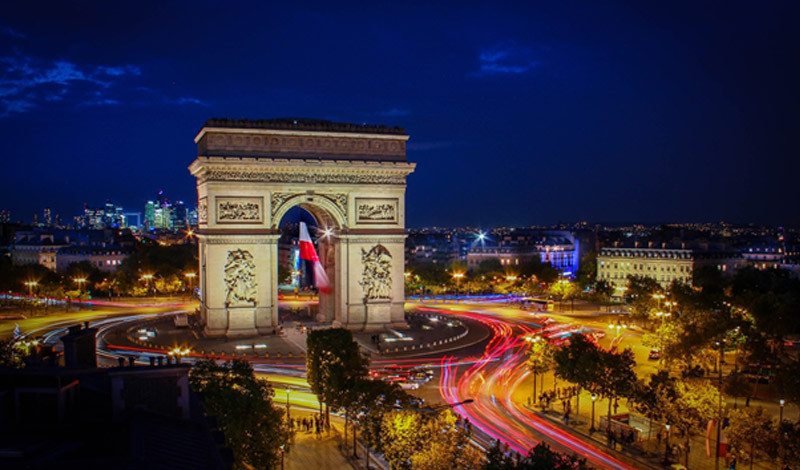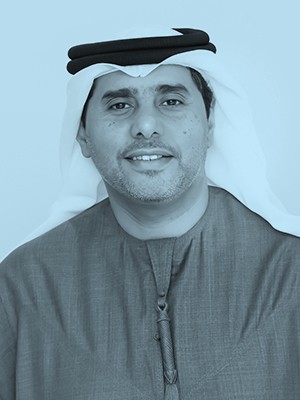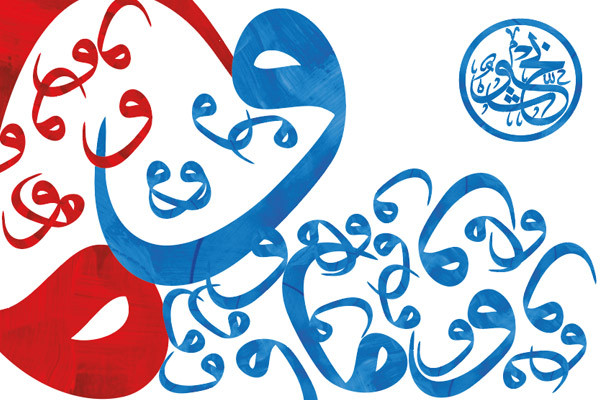Wearing the Colors of the French flag
As the colors of the French flag spread on the landmarks of Abu Dhabi and Dubai the UAE was making a statement of solidarity against terrorism more than a statement of compassion towards France. However, as the world displays solidarity with France, France needs to show solidarity with its Muslim community.

- by Mohammed Abdul Rahman Baharoon ,
- Thursday, 19th November, 2015
The world was shock once again as a treacherous coordinated attack on France killed 129 people of different nationalities and religions. The terrorist attack that Daesh claimed responsibility for was the biggest causality Paris has witnessed since WW2. This attach has galvanized the entire war behind France against the use of terror against innocent people.
Internationally world leaders, including the president of the UAE H.H. Sheikh Khalifa Bin Zayed Al Nahyan, where quick to denounce the attack, not only for the vicious and inhumane nature of the attack but also for its attempt to associate it with Islam and its symbolism as a mark of the threat none-state actors pose.
Internally, nonetheless, France needs to fortify its own community against attempts to further alienate its Muslim population. France has the biggest Muslims population in Europe according to Pew survey of 2010, putting them at 7.5% of the population with about 5 million Muslims. This makes France the country with the highest percentage of Muslims in Western Europe.
The number of Muslims in France has been a source of social friction. The social, and religious aspects of this friction is intermingled. French citizens of Algerian decent continue to feel as a second class in France though the majority of about 4 million of Algerian decent were sons and daughters of Algerian who fought with the French army. French migrant communities, majority Muslim and of Arab decent, have been frequently portrayed by populist rightwing politicians like Marine Le Pen and Nicolas Sarkozy, as France's "enemy within".
Frances Muslim population has also been called the population that leads us around by the nose, [and] which destroys our country by French actress Brigitte Bardot. Bardots animal rights position on slaughtering sheep for Eid Al Adha, soon became galvanized as a right wing political approach against Muslims in particular. This approach lead to positioning of Muslims as anti-secular and therefore a threat to the national identity of the French republic. It is rather alarming to see how much how social, turned to religious insecurity to political agendas and finally into legislation.
The French law 2004-228 of 15 March 2004, otherwise known as the law on secularity and conspicuous religious symbols in schools, was a formal step of making the social friction between political parties into a friction with the French State. The law, which raised many outcries, antagonized the French Muslim population, as it stigmatized the wearer of a headscarf as threat to the secular foundations of the French Republic.
The case of the law 2004-228 is rather curious since the law that is supposed to defend secularism is rather unsecular. The law, and other decision and practices such as a French court ruling in 2008 against granting a Moroccan woman French Nationality on the grounds that her veil and her submissiveness to her husband, is an indication to the level Islam has been defined as an anti-identity for the Tricoleur nation.
The impact of such practices where nothing but the contrary. Frances right wing attempt to maintain the ideal of the oneness, the sameness of all individuals has alienated a 10th of its population and cornered them into an identity struggle. Laws such as 2004-228 has only targeted French citizens based on their religion thus making religion the base of the ruling of the state. Such ruling is anti-secular before it is anti-Muslim. The latent tension among the French people from the two faiths seems to manifest around swimsuits. The New York Times coverage of an incident where a Muslim mother and her 9 year old son who were banned from entering an amusement site on a beach because she is wearing Hijab in May 2015 was soon dwarfed by the famous bikini attack that happened in Reims later on in July. Social media reactions to the attack clearly considered it religious even though the police confirmed that it was not religiously motivated.
In a recent workshop organized by bhuth on dealing with Daesh returnees, the discussants alluded to the importance of social isolation as a means of recruiting for Daesh. This is one of the main reasons Daesh chose to attack France, the latest to join the war on Daesh in Syria, rather than Russia or Iran. The tension between French Muslims and Christians is the objective of the attack not the partygoers of Bataclan Theater or diners at the Voltaire Resturant. Daesh is trying to use the existing tension hoping that its attack will spark a backlash on the Muslim population that would possibly lead to greater clashes among the Muslims and Non-Muslims in France. Such backlash is evident in the attack on the refugee camp in Calais possibly by 'The Angry of Calais' group who posted the video of the fire in the camp hours after the attack, though may be a secluded incident but a serious indicator. Daesh is trying to convince the Muslims in France that they are facing a threat to their identity; identity threats are usually existential. Angry reactions from the French against the Muslims can make that threat real.
As the world mourns with France, and we show solidarity with the French people as they withstand the vicious attacks of terrorism, we also ask the French to make sure that they should not allow the targeting of their Muslim population. I a country like the UAE, which hosts 200 nationalities and its nationals constitute less than a fifth of the population, social cohesion is possible and is the first line of defense against terrorism. France can find an opportunity in the current events to rebuild its National Identity to be less exclusive.
Wear the Tricoleur flag, even if it was a neqab.

Mohammed Abdul Rahman Baharoon
Director General
Read More
Areas of Expertise
- Geo-strategy
- Reputation and soft power
- Public Policy and International Relations
Education
- Master’s degree in English Literature from Texas Tech University in 1995
- English Major from Kuwait University in 1987
Bio
He perused a career in media as a reporter for “Al Arabi” Magazine, Al Ittihad newspaper, and then Editor for Gulf Defense Magazine before starting as director of research at both and focusing on the interplay between Geostrategy and policymaking in governance, stability, capacity building, and future-proofing.
Mohammed has also worked as Deputy Director of Watani (UAE’s first initiative on National Identity) and is also a founding member of the board of “Bussola Institute” a think tank in Brussels that focuses on the changing and emerging aspects of the partnership between the EU and the GCC member states.
As part of his interest in the emerging geostrategic space of the Arabian Peninsula, Mohammed looks at Iran as part of the development of the area as a major trade artery. This development implies developing a sustainable relationship with its regional neighborhood on the Arabian Gulf, The Arabian Sea, the Red Sea, or the Mediterranean. Iran is a major component of that space and becoming more adaptable to the modernization process will allow it to become part of the future development of the region.

